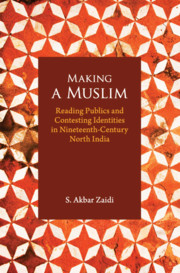2 - Zillat, apne hāthon se
Published online by Cambridge University Press: 24 March 2021
Summary
The theme of zillat, utter humiliation, must have weighed heavily on the mind of the poet Altaf Hussain Hali for at least half a century. Hali wrote his Musaddas in 1879, yet it did not put the matter to rest. It had not calmed his troubled soul to speak out about his feeling of concern for his brethren. Writing two decades later in 1897, he wrote his outstanding Yādgār-i Ghālib, the biography and appreciation of Asadullah Khan Ghalib's (1797–1869) poetry, in which the very first words of the preface stated: Terhwīn sadī hijrī men jab ke musalmānon kā tanazzul ghāyat darje ko pahunch chukā thā aur un kī daulat, ’ izzat, aur hukūmat ke sāth ’ ilm o fazl aur kamālāt bhī rukhsat ho chuke the … (In the thirteenth century hijri [c. AD 1785–1882] the decline of the Muslims had reached its lowest ebb, and along with their ’ izzat [respect, honour], station and government and wealth, they had lost their knowledge, virtue, and achievements …). He goes on to add, that even at the time when he first went to Delhi, which was in 1854, the decline had set in.
Throughout this biography of 1897, there are numerous examples of and references to decline, decay, loss, the girī hu‘ī qaum (fallen qaum) and so on. In Ghalib's biography, Hali uses the term zillat, regarding the poet's feeling about the condition of Muslims. Hali wrote, ‘Although Mirza [Ghalib] was not particularly a follower of the scriptures, whenever he heard something concerning the Muslims’ zillat, he became extremely saddened “Musalmānon kī zillat kī ko‘ī bāt sun pate the, tau un ko sakht ranj hotā thā”’. Hali writes that one day in front of him (which means this would have been in the late 1860s), Ghalib said, in Hali's words, Mujh men ko‘ī bāt musalmānon kī nahīn hai, phīr main nahīn jāntā ke musalmānon kī zillat par mujh ko kyun is qadr ranj o ta‘assuf hotā hai (There is nothing of the Muslim in me, so I don't know why the Muslims’ zillat causes so much grief and remorse).
- Type
- Chapter
- Information
- Making a MuslimReading Publics and Contesting Identities in Nineteenth-Century North India, pp. 79 - 119Publisher: Cambridge University PressPrint publication year: 2021



